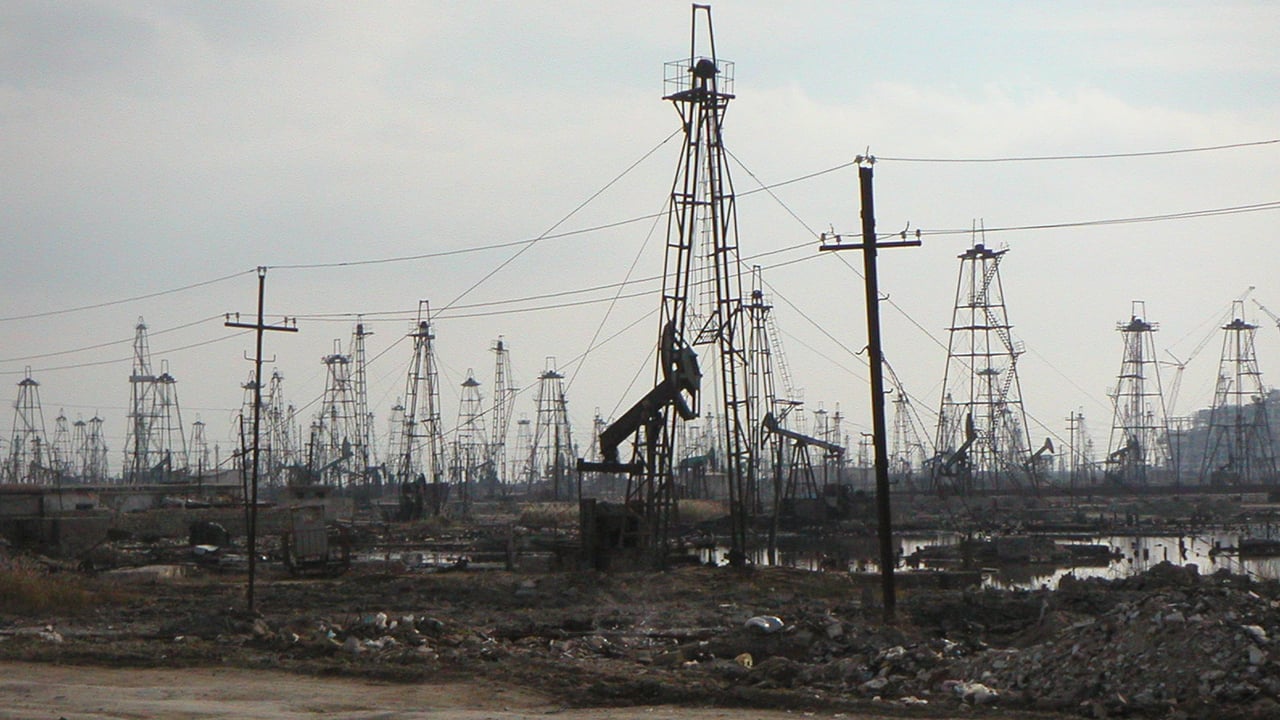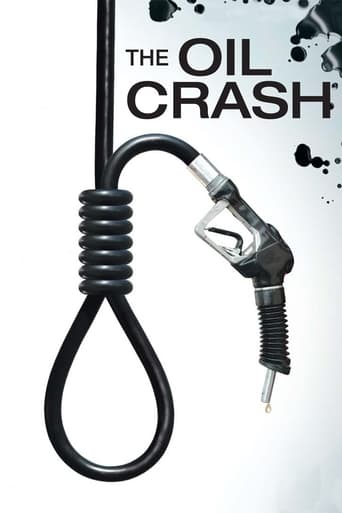Phonearl
Good start, but then it gets ruined
Aedonerre
I gave this film a 9 out of 10, because it was exactly what I expected it to be.
Invaderbank
The film creates a perfect balance between action and depth of basic needs, in the midst of an infertile atmosphere.
Howard Johnson
A documentary interviewing several scientists, politicians and others "in-the-know" regarding the end of oil's influence on our daily lives. The main gist of the presentation is common sense: the U.S. has been living high on the hog because of cheap oil. It's been known for a while that cheap oil will eventually end. That time has come.History is littered with great civilizations that eventually collapsed. Did you ever wonder if and why our civilization will follow? Watch this movie and learn your fate.This is a great, yet chilling documentary that everyone should watch. It is the ultimate thriller because it's not fiction. What's behind the next bend waiting to jump out at you? It's the scariest boogie monster of all: reality.
fwomp
The most fascinating aspect to A CRUDE AWAKENING is that the film was made not by some left-wing conspiracy theorists with ties to Greenpeace or The World Wildlife Fund, but by two Swiss directors, one (Gelpke) with a background in anthropology, economics, war reporting, and science films, and the other (McCormack) who holds an honors degree in Environmental Policy and Management. These two men know how to make a documentary that looks at both sides of our oil needs and industry while not knocking our addictive behavior towards gasoline. It does lack a few aspects in the end, but holds your attention enough to make the whole watchable.The focus, as the title suggests, is on our crude oil dependency. We all know oil won't last forever, right? Right? Please tell me you know this. If not, you really need to watch this film. It looks at the boom and bust methodology used in early crude oil finds and how we naively thought (up until the 1970s) that oil/gas would last forever.The story slashes across socio-economic ground, taking in opinions from specialists in the field to Senators and economists. All of them, without exception, realize that oil isn't going to last much longer. The need to find alternative fuels that are (and here's the key) affordable is on.The great thing is that these men and women talk about how vital oil and natural gas is to our financial existence, simply because it is so cheap. You just can't find energy this affordable. Fuel cell technology, hydrogen fuels, solar, and many other alternatives are discussed but are exceptionally expensive to produce and market to the general population. No doubt we have a lot of worries coming our way as carbon-based fuels become more and more scarce.The only lacking aspect in this documentary was that there's very little time given over to these alternative energy methods, and no experts on said same. All of the information comes from experts in the gas industry or those who monitor it. To truly round-out the program I would've liked to have seen specialists in alternative car manufacturing and other items that are undoubtedly headed our way.Still, this is an insightful documentary to get your hands on. And one to show your kids to get them on-the-ball about what they can do to help decrease our oil addiction.
ReliableSource
Those whom the documentary "A Crude Awakening" fails to awaken now, to the fast approaching consequences of peaked oil depletion, at a time of unprecedented, and ever growing demand, just may not be awakeable, or won't likely wake up before it's too late.Unlike that other much hyped Hollywood liberal misappropriation of the catastrophic global warming issue, to serve the personal needs of one disingenuous politician, "A Crude Awakening" is a Swiss production, that employs a broad range of viewpoints, from 27 scientists and energy experts, who's collective opinions all provide greater credibility to the message.There's enough information concisely crammed into this one and half hour film for it to be the basis of a full semester's self-directed course of study... perhaps several semesters. In the special features, included on the DVD version, there is an extra chapter on the problems of petrostates, and four extended interviews with the following experts:Colin Campbell: Oil geologist; consultant to numerous oil companies; and founder of ASPO www.peakoil.netMatt Simmons: Energy investment analyst; author of "Twilight in the Desert"Fadhil Chalabi: Former Acting Secretary-General of OPEC; and former Iraqi Oil MinisterDavid L. Goodstein: Professor of Physics and Applied Physics at the California Institute of TechnologyWhile many viewing this documentary might perceive its realistic appraisal of the demise of cheap and abundant energy as pessimistic, I consider it to be objectively quite optimistic, considering that it did not linger long on the very inconvenient truth that there are over six billion people wanting to have a petroleum based high standard of living, that can't possibly be sustained for much longer, even if there were only two billion people wanting it. "Civilization" has only ever had one answer for that kind of problem. The thin thread that "A Crude Awakening" seems to hang its optimism on is the assumption that if enough people become fully aware of this totally unavoidable event sooner, rather than later, then human ingenuity, combined with a level of human cooperation the world has never before seen, might possibly attenuate the consequences for at least some of those who awaken.
Chris_Docker
In 2004, the loud and politically motivated director Michael Moore made a splash with Fahrenheit 9/11, lambasting the Bush administration and making rude noises about the connections between oil and politics. The lack of academic rigour in his film allowed it to be dismissed as disingenuous, although it created plenty of waves in the minds of the anti-Bush camp, at least. Then in 2005, Stephen Gaghan made Syriana, a tense, well-researched, politically charged drama about the oil industry - which made plenty of sense to those steeped in world politics and economics, without outwardly offending anybody. Now in 2006 two directors in Switzerland make A Crude Awakening - The Oil Crash, a painstaking documentary about the frighteningly central role of oil in our lives. Gelpke has a background in anthropology, economics before working as a news/war reporter and then becoming involved in scientific film-making. McCormack worked in corporate film-making and documentaries but also holds an Honours Degree in Environmental Policy and Management. As you might expect, this film relies not on hearsay or fictionalised evidence, but interviews with notable academics, experts and advisors from across the political, corporate and economic spectrum. The film's official website is awash with official protocols, reports, and other evidence to help you check their sources. It has no discernible political axe to grind. In other words, it's hard to ignore.Maybe you've read a lot of literature and have made some connections. You know that the globe faces an energy crisis. Yes? Think again. If you thought it was serious, multiply that a hundred-fold and start examining it on your mother's life - or rather that of your children. If you thought there was a connection between oil and foreign policy, good or bad, stop and realise that the underlying mechanics are much deeper than that and go to the root of things you never even dreamed of. Stop, and imagine your cosy world coming to an end.A Crude Awakening starts off by calling oil 'the excrement of the devil'. That is the first and last piece of rhetoric - the rest is cold examination of evidence; which is perhaps one of the reasons it then has to work so hard to make its rather dry subject interesting . . . I was tired enough to nod off while watching it, but the cold and careful facts started seeping down my neck until I was almost in a state of shock.Oil and other fossil fuels, compared to human physical labour, is so efficient as to make it look almost free by comparison. If we take away everything around us in our modern world that has not been affected by oil in some way, from food to manufacturing (but particularly transport), there is hardly anything left. Our cities, have consequently been designed and built (unlike most of those in Asia and much of the world, that pre-date the rise of oil) around an almost never-ending supply of cheap oil. There is no 'easy going back.' With Western supplies dwindling, and the main sources being ever more in the hands of rogue or unstable governments, oil, essential to our continued way of life (and a modern way of life that developing countries would emulate), becomes a catalyst and magnet for war. From 1945, the promise of security to Saudi rulers became the exchange currency for the promise of a cheap supply of oil. Ordinary Saudis however have seen a massive drop in their quality of life, which has led to discontent and the attraction of terrorism, especially by migrating to neighbouring countries where there is are bigger power vacuums.The present lifestyle of the West, according to the range of least-to-most optimistic figures presented in the film, is impossible to maintain. This produces some bleak options. 1) militarise oil - in other words, say to people, if you want to keep your current way of life and present civilisation, be prepared for a lot of wars to secure the oil necessary; or 2) kick oil dependence, which means developing new technology. Although some of the scientists in the film try to be upbeat about never underestimating the human capacity for technology, they mercilessly dissect the present known options to show that, even with the best outcomes, the result would be the tiniest drop in the ocean of what is required.In the absence of sufficient fossil fuels, they suggest that a world population of the current size would be difficult to maintain. We have an unsustainable lifestyle. Pushed into the corner, do you want to get the bicycle to work - even if it's fifty miles away? Or do you want to say, it's a future generation's problem? Put so starkly, the neo-con solution of 'democratising the Middle East' to ensure oil supplies in a publicly acceptable (or marketable) way, sounds a more realistic me-first solution than many liberals would care to admit . . . How much world poverty and deprivation, not in third world countries but our own, can the we stomach - and how much will our children have to stomach? Would you rather not know? Or do you maybe want to see this film . . .

